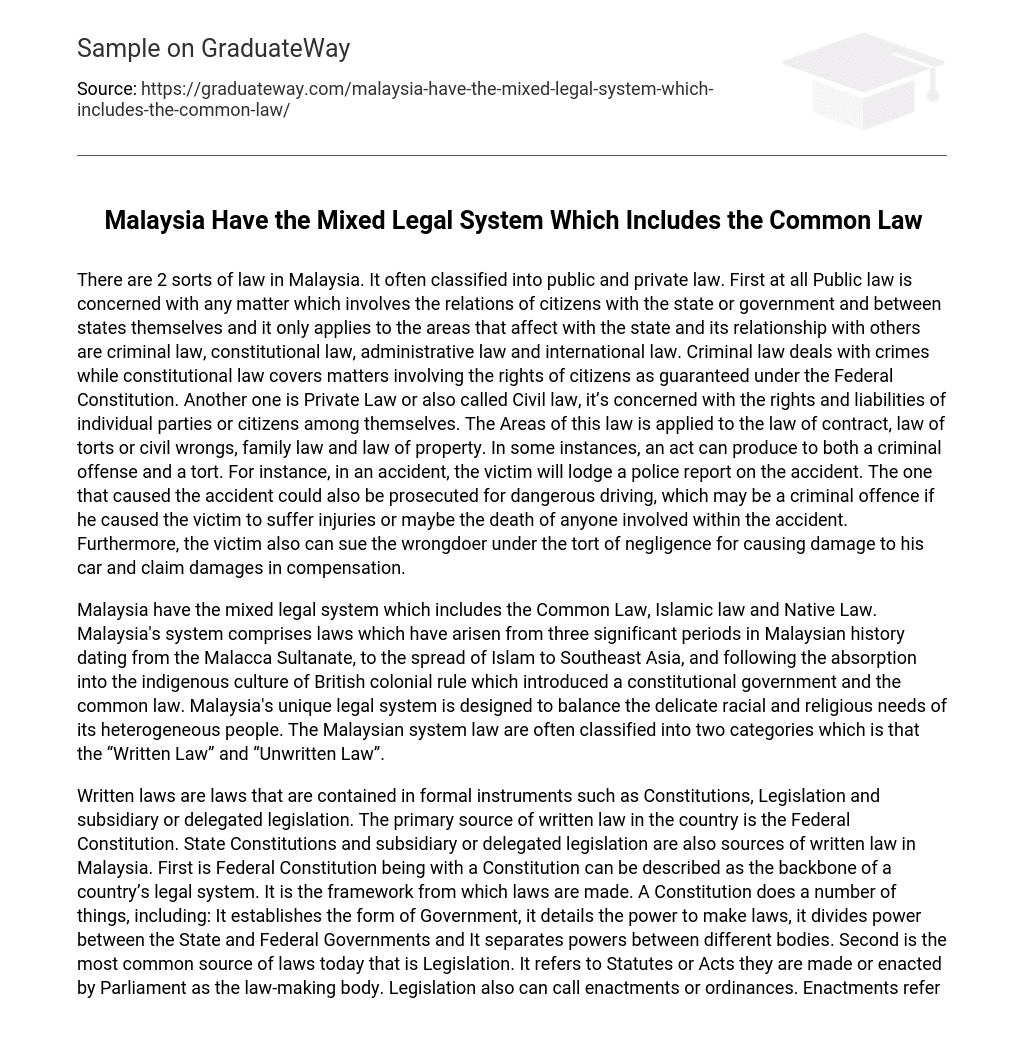There are 2 sorts of law in Malaysia. It often classified into public and private law. First at all Public law is concerned with any matter which involves the relations of citizens with the state or government and between states themselves and it only applies to the areas that affect with the state and its relationship with others are criminal law, constitutional law, administrative law and international law. Criminal law deals with crimes while constitutional law covers matters involving the rights of citizens as guaranteed under the Federal Constitution. Another one is Private Law or also called Civil law, it’s concerned with the rights and liabilities of individual parties or citizens among themselves. The Areas of this law is applied to the law of contract, law of torts or civil wrongs, family law and law of property. In some instances, an act can produce to both a criminal offense and a tort. For instance, in an accident, the victim will lodge a police report on the accident. The one that caused the accident could also be prosecuted for dangerous driving, which may be a criminal offence if he caused the victim to suffer injuries or maybe the death of anyone involved within the accident. Furthermore, the victim also can sue the wrongdoer under the tort of negligence for causing damage to his car and claim damages in compensation.
Malaysia have the mixed legal system which includes the Common Law, Islamic law and Native Law. Malaysia’s system comprises laws which have arisen from three significant periods in Malaysian history dating from the Malacca Sultanate, to the spread of Islam to Southeast Asia, and following the absorption into the indigenous culture of British colonial rule which introduced a constitutional government and the common law. Malaysia’s unique legal system is designed to balance the delicate racial and religious needs of its heterogeneous people. The Malaysian system law are often classified into two categories which is that the “Written Law” and “Unwritten Law”.
Written laws are laws that are contained in formal instruments such as Constitutions, Legislation and subsidiary or delegated legislation. The primary source of written law in the country is the Federal Constitution. State Constitutions and subsidiary or delegated legislation are also sources of written law in Malaysia. First is Federal Constitution being with a Constitution can be described as the backbone of a country’s legal system. It is the framework from which laws are made. A Constitution does a number of things, including: It establishes the form of Government, it details the power to make laws, it divides power between the State and Federal Governments and It separates powers between different bodies. Second is the most common source of laws today that is Legislation. It refers to Statutes or Acts they are made or enacted by Parliament as the law-making body. Legislation also can call enactments or ordinances. Enactments refer to those laws enacted by the State legislative assembly as the law-making body whereas, ordinances refer to those laws made prior Independence Day in 1957. Lastly is Subsidiary legislation or delegated legislation that refers to a law made or passed by a body or agency other than the Parliament or state legislative assembly example Ministers, statutory bodies, district councils and each other. It also can be defined in Interpretation Act 1967 to include any proclamation, rule, regulation order, notification or other instrument made under any Act, Enactment or Ordinance and having legislative effect.
The unwritten sources of law refer to laws which are not created by Parliament or found in the constitution. Thus, such laws may be in writing but are not enacted by the legislature. There are 2 Law is under the unwritten Law. First is Judicial decisions by the highest court, means that the judge made laws or common law. Second is English law, the principles of English law so far as they were suitable to local conditions. Other law is Islamic laws /Syariah and this law is only applicable to Muslims or other situation example a non-Muslims can be force to marry a Muslims and they need to convert into Muslim. In normal cases a non-Muslim cannot challenges Muslims right or questioning them. Another law is Native Law. This is Law only applicable in Sabah, Sarawak, at the West of Malaysia.
The application of judicial precedent will affect the society at large because judicial precedent can be defined as a judgment of a court of law, cited as an authority for deciding an identical set of facts during a similar case. a choice of the court is employed as a source for future decision because, while giving judgment during a case, the judge having began the facts of the case, will state the laws applicable to the facts and supply his decision on the case. Such decision given by the judge of a better court, which remains binding on all other courts below and accepted as binding on such courts below, shall become authority for future similar decision and be considered judicial precedent. Judicial precedent which is additionally referred to as Stare Decisis, means to face by what has been decided during a case in court or to face by earlier decision made in court by judges. Further, judicial precedent is often defined as a judgment that’s binding on lower courts or other equal courts of an equivalent jurisdiction, with regards to its conclusion on some extent of law and should also, be persuasive to courts of equal and other jurisdiction in future cases involving sufficient similar facts.





